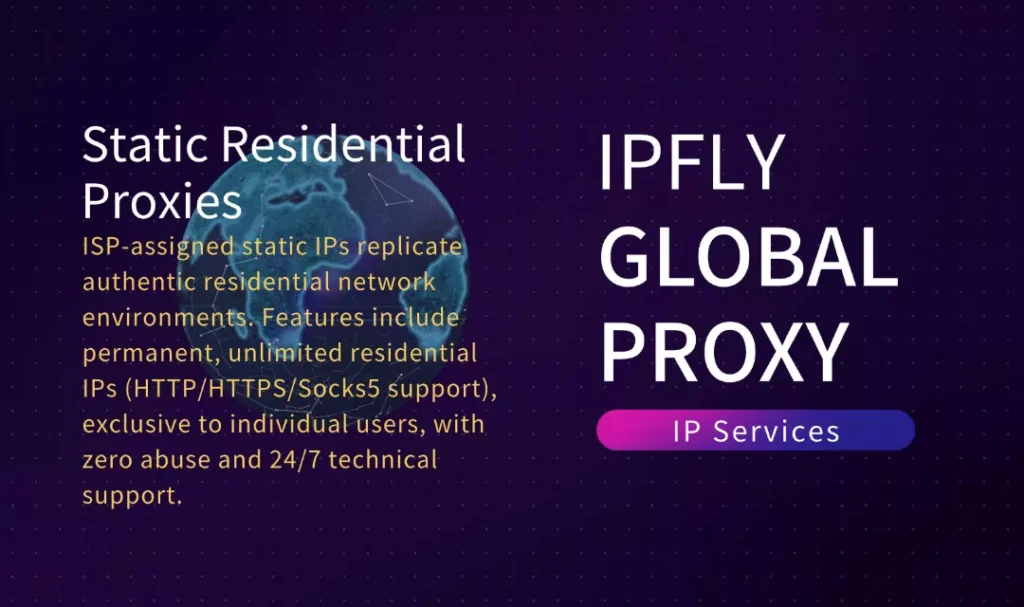In the dynamic and fast-paced world of the internet, where data shifts in milliseconds, the most valuable asset for many professional operations is stability. For businesses managing online accounts, accessing secure networks, or conducting precise web testing, a consistent digital identity is not a luxury—it’s a necessity. This is achieved through a powerful tool known as the long-term proxy IP.
This comprehensive guide will serve as a definitive resource on long-term proxy IPs. We will cover precisely what they are, why they are fundamentally different from their rotating counterparts, their most critical business applications, the key types available, and best practices for their strategic implementation.

The Core Principle: Stability in a Dynamic World
A long-term proxy IP, often referred to in the industry as a static or dedicated IP, is a consistent, unchanging IP address provided by a proxy server for extended, and often exclusive, use.
Unlike a rotating proxy where the IP address changes with every request or after a few minutes, a long-term proxy provides a stable, predictable digital identity.
To use a business analogy:
A rotating proxy is like operating from a series of different, temporary P.O. boxes. This is excellent for tasks that require anonymity and volume, like large-scale data gathering.
A long-term proxy is like having a permanent, registered corporate office address. It builds trust and recognition with online platforms and security systems. For any operation that relies on a consistent, trusted relationship, this stable address is non-negotiable.
Key Applications: When is a Long-Term Proxy IP Necessary?
While rotating proxies are built for scale, long-term proxies are built for trust and access. They are essential in any scenario where an online platform’s security algorithm scrutinizes the consistency of your connection.
1.High-Security Account Management
Platforms such as social media networks (Instagram, Facebook), e-commerce marketplaces (Amazon, eBay), and financial services use IP consistency as a primary security signal. Logging into an account from a constantly changing IP address is a major red flag for their security systems. A long-term proxy IP ensures that all activity associated with a specific account originates from the same trusted address, dramatically reducing the risk of security challenges, CAPTCHAs, and account suspensions.
2.Accessing IP-Whitelisted Systems
Many corporate networks, secure databases, and private APIs are protected by IP whitelisting. This is a security model that denies access to all IP addresses by default, only granting entry to a pre-approved list. A long-term proxy IP provides a fixed, reliable address that can be given to a network administrator to be placed on this “digital guest list,” guaranteeing secure and consistent remote access to critical infrastructure.
3.Ad Verification and Website Testing
When verifying that geo-targeted ads are being displayed correctly or testing how a website functions for users in a specific region, consistency is key. A long-term proxy IP provides a stable baseline, allowing developers and marketers to conduct accurate tests without the variable of a changing IP address, which could alter the content or user experience being served.
The Source Matters: Datacenter vs. Residential Long-Term IPs
The effectiveness of a long-term proxy is determined by the source of its IP address.
Long-Term Datacenter IPs: These are static IPs sourced from servers in a commercial data center. They are fast, reliable, and cost-effective. They are an excellent choice for tasks like accessing an IP-whitelisted system where the source of the IP is less scrutinized than its stability.
Long-Term Residential IPs: This is the gold standard for high-trust applications. A long-term residential IP combines the stability of a static address with the unparalleled authenticity of an IP address assigned by a real Internet Service Provider (ISP) to a home. It is the most effective tool for managing sensitive online accounts, as its traffic is indistinguishable from that of a real user.
Strategic Implementation and Sourcing
When implementing a strategy that relies on digital consistency, sourcing your long-term proxy IPs from a reliable network is paramount. For applications demanding the highest level of trust, such as managing sensitive brand accounts, a long-term residential IP is the optimal solution.
A professional provider like IPFLY, for example, specializes in offering static residential IPs. This provides businesses with a stable, high-reputation IP address sourced from a real ISP, combining the benefits of long-term consistency with unparalleled authenticity. This level of quality is essential for mission-critical tasks that cannot afford disruptions from security flags or IP blocks.
Stop figuring out proxy usage tricks alone! Visit IPFLY.net to learn about our excellent proxy services, and more importantly, join the IPFLY Telegram community—exchange experiences with peers, get exclusive strategies, and upgrade your proxy experience from “usable” to “excellent”. Act now!

A Cornerstone of Professional Online Operations
A long-term proxy IP is an essential component of any sophisticated online business strategy. It provides the stable, trusted digital identity required to safely manage high-value accounts, access secure systems, and conduct reliable testing. In a digital ecosystem that scrutinizes every connection, a long-term proxy IP is not just a tool, but a foundational asset for any serious, professional online operation.


